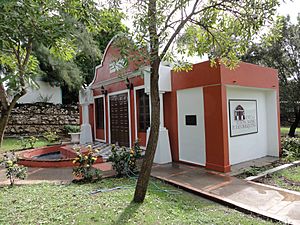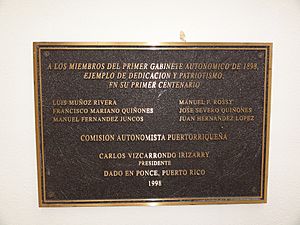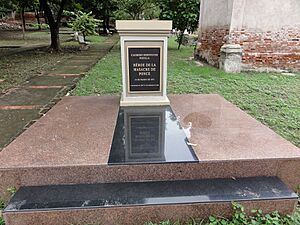Museo del Autonomismo Puertorriqueño facts for kids

Museo del Autonomismo Puertorriqueño in Barrio Segundo
|
|
| Lua error in Module:Location_map at line 420: attempt to index field 'wikibase' (a nil value). | |
| Established | 7 September 2006 |
|---|---|
| Location | Panteón Nacional Román Baldorioty de Castro, Calle Torre # 1 at Calle Frontispicio, Ponce, Puerto Rico |
| Type | Political history museum |
| Owner | Ponce Municipal Government |
The Museo del Autonomismo Puertorriqueño (which means Museum of Puerto Rican Autonomism) is a small museum in Ponce, Puerto Rico. It teaches visitors about the political history of Puerto Rico. The museum especially highlights how the city of Ponce and its people helped shape this history. The museum opened its doors on September 7, 2006.
Contents
Museum History
The museum was created in 2006. This happened when Francisco Zayas Seijo was the mayor of Ponce.
Where to Find the Museum
The museum is located inside the Panteón Nacional Román Baldorioty de Castro. This place is also known as the Román Baldorioty de Castro National Pantheon. The Panteon is a special area in Barrio Segundo in Ponce, Puerto Rico. It was first planned as a cemetery for the city. Later, it became a famous burial site for important people.
The Panteon was started in 1842. It is Puerto Rico's first and only national pantheon. It is also the only cemetery in Puerto Rico and the Caribbean that is also a museum. You can find the Panteon and its Museum of Puerto Rican Autonomism at Number 1 Calle Torres, at the corner of Calle Frontispicio, in Barrio Segundo, Ponce.
What the Museum Teaches
The main goal of the museum is to show the history of "autonomism" in Puerto Rico. Autonomism is the idea of a place having the power to govern itself, while still being part of a larger country. In 2009, the city also asked the Pontifical Catholic University of Puerto Rico School of Architecture to study how to rebuild the Panteon.
What You Can See at the Museum
The museum has three main collections that are always on display.
- The first collection shows Puerto Rico's journey to gain more self-rule in the 1800s.
- The second collection focuses on Puerto Rico's self-rule in the 1900s.
- The third part of the museum is about how the Ponce city government gained more independence.
Each display shows how Ponce played a big role in the history of Puerto Rican autonomism. It especially highlights the actions of former governor Rafael Hernández Colón. He was important in developing self-rule in the late 1900s. He also helped create Puerto Rico's Law of Autonomous Municipalities in 1991. This law helped cities like Ponce gain more control over their own affairs.
Why This Place is Important
The cemetery next to the museum is special because many important Puerto Ricans are buried there. The most famous person buried in this historic cemetery is Ramon Baldorioty de Castro. He was a respected Puerto Rican patriot, journalist, teacher, writer, and speaker. He also worked to end slavery.
In 1870, he was chosen to be a delegate to the Cortes of Cádiz in Spain. There, he spoke out against slavery. He was responsible for many changes that led to freedom. Later, on March 23, 1873, slavery was officially ended. Baldorioty de Castro is known as the father of Puerto Rican autonomism.
The former mayor of Ponce, Churumba, who also supported autonomism, has a special tomb here. The remains of nationalist hero Casimiro Berenguer are also buried in this cemetery.
See also
 In Spanish: Museo del Autonomismo Puertorriqueño para niños
In Spanish: Museo del Autonomismo Puertorriqueño para niños
 | Misty Copeland |
 | Raven Wilkinson |
 | Debra Austin |
 | Aesha Ash |



